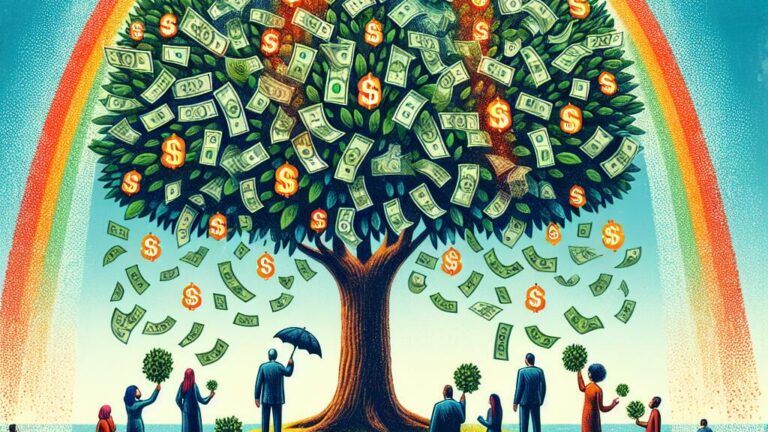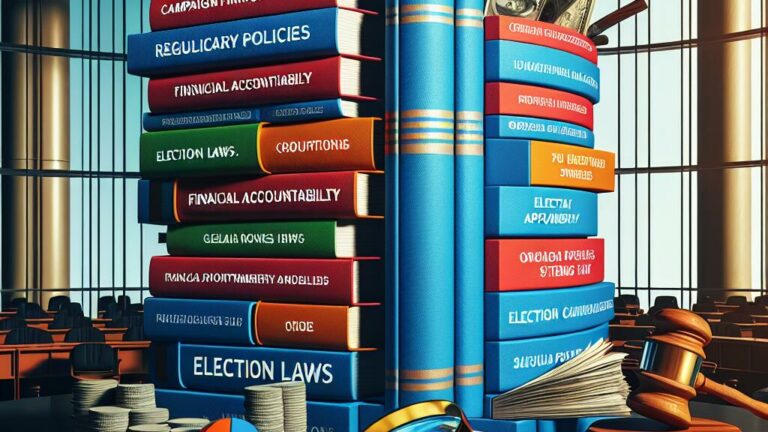The Impact of Big Money in Political Campaigns
Table Of Contents
Understanding the Impact of Big Money in Political Campaigns
Key Takeaways
- Influence of substantial funds on electoral processes and comprehension of finances in governance
- Function of large financial resources in electoral activities
- Consequences of significant monetary contributions on political funding
- Impacts on candidate actions and policy decisions
- Community views and confidence in the political framework
- Initiatives aimed at improving campaign funding regulations
The Impact Of Big Money In Political Campaigns | Understanding Money in Politics
The impact of big money in political campaigns has reshaped the landscape of American democracy. The influence of money on politics is evident in the way political contributions flood into campaigns, allowing candidates to amplify their messages through extensive political advertising. Public financing of campaigns aims to level the playing field; however, high campaign spending often skews the competition in favor of those with affluent political donors. Critics argue that this reliance on financial backing leads to increased lobbying efforts and policy decisions that prioritize donor interests over constituents. Understanding the intricacies of campaign finance is crucial, as political donations from Super PACs and dark money entities continue to exert significant influence on the electoral process.
The Impact of Big Money in Political Campaigns | Definition and Scope of Money in Politics
Big money has significantly shaped the landscape of politics, particularly in the realm of election campaigns. The influence of wealth in political representation is evident, especially during presidential campaigns where significant sums are spent to sway voters. Corporate campaign contributions have become a pivotal aspect of campaign finance laws, allowing for powerful interests to exert control over political narratives. This has led to a complex environment where politicians often find themselves balancing the demands of donors against the expectations of their constituents.
The scope of campaign finance regulation in the United States reflects the ongoing struggle between maintaining electoral integrity and accommodating the realities of partisan politics. As campaign finance laws evolve, the implications on political rallies and election strategies become more pronounced. A careful examination of The Impact of Big Money in Political Campaigns reveals how financial backing can dictate the priorities of politicians, often leaving voter interests overshadowed by the influence of affluent donors.
Historical Context of Financial Influence
The Impact of Big Money in Political Campaigns has evolved significantly over the decades. Early political committees primarily relied on grassroots fundraising and community engagement to support candidates and issues on the ballot. As elections became more competitive, political action committees emerged, allowing for organized fundraising efforts. This shift enabled candidates to raise larger sums of money, which influenced not only their ability to campaign effectively but also their responsiveness to the interests of their donors, often political action committees focused on specific economic policies.
The establishment of various regulatory frameworks has had a profound impact on how financial influence manifests in elections. Initial campaign finance laws sought to limit the power of money in politics, but over time, loopholes and court rulings have paved the way for the rise of super PACs and dark money channels. These developments have changed the landscape of fundraising and activism, allowing substantial contributions to shape ballot measures and sway public opinion. The ongoing debates around the role of financial backing in shaping economic policy continue to highlight the intricate relationship between money and political influence in the electoral process.
The Role of Big Money in Political Campaigns
The landscape of federal elections is increasingly shaped by the influence of substantial financial resources, a phenomenon often referred to as the Impact of Big Money in Political Campaigns. Political scientists have observed that capital income plays a pivotal role in determining which candidates can effectively reach voters across the political spectrum. The bipartisan campaign reform act was designed to address some of these concerns, yet the rise of dark money has complicated the regulatory environment. Candidates often rely on profits from wealthy donors, leading to a tangled web of influences that can sway policy decisions. Public financing initiatives seek to level the playing field, but the ongoing struggles between the desire for reform and the realities of campaign finance highlight the complexities of securing electoral integrity.
Sources of Campaign Financing
Campaign finance matters significantly influence the landscape of political campaigns. The impact of big money in political campaigns comes largely from wealthy campaign donors who fund various political spending efforts. Economic analysis reveals that these financial contributions can sway election outcomes and shape political influence in favor of candidates backed by substantial resources. Main thing campaigns are often strategically designed to appeal to the interests of these donors, raising questions about the true priorities of elected officials.
The role of big money is evident in how candidates allocate resources toward outreach and engagement with voters. Political effects stemming from financial backing often create a dynamic where candidates prioritize the concerns of affluent donors over those of the general electorate. Achieving political success may depend on attracting significant funding, leaving many to wonder about the overall responsiveness of elected officials to their voters amidst rising campaign costs. The impact of big money in political campaigns thus becomes a critical factor in understanding modern electoral dynamics.
The Evolution of Campaign Contribution Limits
Over the decades, the landscape of campaign finance has undergone significant changes, reflecting the ongoing struggle between regulating contributions and accommodating the need for candidates to engage in effective campaign fundraising. The Impact of Big Money in Political Campaigns has grown more pronounced, especially as political activism surged. Corporate campaign spending has been a pivotal factor in shaping the structure and limits of election campaign finance. Major political movements, such as the rise of Super PACs, have challenged existing spending limits, transforming congressional campaigns into arenas where financial backing is often the key to success.
The adjustments to political spending limits have created a complex environment for candidates and their supporters. As campaign spending increases, both the perception and reality of political competition intensify. These evolving regulations reflect a broader debate about the balance of power in politics and the influence of wealth on policy outcomes. The changing campaign finance status signals a need to reassess the implications of The Impact of Big Money in Political Campaigns on democratic processes and electoral integrity.
The Impact of Big Money on Political Contributions
The involvement of substantial financial resources significantly skews the campaign finance system, leading to an imbalance in political competition. Political candidates increasingly rely on campaign donors who can provide the necessary funds to produce compelling political ads and enhance visibility. This trend has essentially transformed the traditional campaign finance landscape, making it difficult for less wealthy candidates to compete. As a result, political participation often hinges on the ability to attract big money, which can directly influence political policies. The impact of big money in political campaigns fosters a system where the voices of affluent donors are magnified, leading to concerns about the integrity and fairness of the electoral process.
Patterns of Political Giving
Patterns of political giving have evolved significantly in recent years, reflecting the influence of The Impact of Big Money in Political Campaigns on the political system. Money individuals contribute often stems from their desire to gain political access and leverage connections within the political process. With rising campaign spending limits, contributors seek to support political parties and candidates who align with their interests. This trend has led to an expensive election cycle, where the need for funding can overshadow the core messages of new politicians seeking office.
The relationship between contributions and candidates indicates a shift towards prioritizing financial backing over grassroots support. This dynamic creates the potential for unnecessary campaign spending, as candidates often feel compelled to invest heavily in their campaigns to compete effectively. Political connections can dictate the flow of funds, leading to disparities in resources among candidates. Ultimately, these patterns highlight the challenges within the political system, where the influence of big money complicates the pursuit of democratic ideals and accountability.
- Increased reliance on high-dollar donors over small contributions from individuals.
- Growth of Super PACs and their role in financing campaigns.
- Emergence of digital fundraising strategies to attract a broader base of support.
- Trends toward transparency and disclosure of campaign contributions.
- Impact of corporate and special interest money on policy decisions.
- Increased competition among candidates for financial backing.
- Challenges to equitable representation due to funding disparities.
The Influence of Super PACs and Dark Money
Super PACs and dark money groups have dramatically reshaped the political map, especially in partisan elections. These entities frequently operate outside traditional campaign finance restrictions, allowing for significant corporate election spending that vastly increases the cost of money in political campaigns. The sheer volume of election spending from these sources can drown out the voices of average voters, altering the political system today and making funding a crucial factor in determining the success of re-election campaigns.
The impact of big money in political campaigns is also evident in how candidates respond to donor interests over voter needs. Political protest often arises from concerns that unchecked campaign finance deregulation allows a select few to dictate policy outcomes, sidelining the broader electorate. As official campaign committees struggle to compete with the vast sums raised by Super PACs, the integrity of the political process is increasingly questioned, causing many to advocate for substantial reforms in campaign finance.
Effects on Candidate Behavior and Policies
The Impact of Big Money in Political Campaigns significantly alters candidate behavior and policy decisions. Political ties with big donors lead to a preference for the interests of wealthy contributors over those of average voters. As total election spending escalates, particularly in senate campaigns, candidates often focus on early fundraising efforts to secure their electoral success. This trend is evident in the united states campaign landscape, where the financial backing from political actors shapes legislative priorities and influences policy outcomes. Bipartisan campaign reform efforts struggle to keep pace with increasing election spending, leaving the political turnover largely dictated by the interests of a select few. Understanding these dynamics is crucial for evaluating how the financial underpinnings of campaigns impact democratic processes.
Responsiveness to Donors vs. Voters
The Impact of Big Money in Political Campaigns significantly sways political incumbents to prioritize the interests of large donors over small-money donors. Fundraising often becomes a crucial focus for candidates and their campaign staff, leading to the formation of partisan coalitions that may not reflect the general electorate’s desires. Candidates may feel pressured to align their policies with the preferences of those providing unlimited campaign donations rather than their constituents. This phenomenon raises questions about the true representation of voter interests in state elections and federal elections.
Campaign financing intricacies reveal how secret money can undermine the democratic process. Political science studies illustrate that financial contributions play a pivotal role in shaping candidate behavior. The reliance on large contributions can create a disparity in responsiveness, where the voices of everyday voters get drowned out by powerful financial interests. Despite the existence of federal election funding mechanisms designed to mitigate these effects, the reality remains that the Impact of Big Money in Political Campaigns often skews priorities away from public needs toward donor expectations.
- Candidates may prioritize legislation benefiting large donors over the general electorate.
- The reliance on big money can lead to policies that favor corporate interests instead of constituent needs.
- Voter disillusionment may increase as constituents feel their voices are marginalized.
- Campaign finance reform is necessary to restore balance in political representation.
- Transparency in political donations can help voters understand where candidates’ loyalties lie.
- Engaging small donors can empower grassroots movements and enhance democratic participation.
- Public financing options can level the playing field for candidates with limited resources.
Policy Outcomes Influenced by Financial Backing
Large sums of money in political campaigns can significantly influence policy outcomes. The Impact of Big Money in Political Campaigns is often reflected in the way budgets are allocated, particularly favoring initiatives aligned with the interests of huge donors. High fundraising totals frequently translate into tangible results, such as legislation that benefits powerful reform initiatives or favors specific industries. Dark money groups play a crucial role in this dynamic, enabling funding to flow without clear accountability, further amplifying the voices of those with capital.
The trend of unlimited campaign spending allows candidates to prioritize the interests of their financial backers over their constituents. Political outsiders often struggle to compete against traditionally funded opponents, illustrating the disparity in political influence among candidates. Campaign stickers may promote a candidate’s message, but the underlying capital income measure reveals the true power dynamics at play. Dark money donors subtly shape political discourse, ensuring that the policies enacted reflect their interests rather than the average house campaign’s needs.
Public Perception and Trust in the Political System
The Impact of Big Money in Political Campaigns shapes the landscape of U.S. politics today. Candidates often rely on traditional fundraising operations, which can lead to an overwhelming influence from large donors in both federal and state elections. The growing reliance on monetary gain has shifted election approaches, where major expenses overshadow grassroots donations. This dynamic creates economic effects that raise concerns about the integrity of the electoral process. Voter sentiment increasingly reflects skepticism towards candidates perceived as beholden to their financial backers rather than their constituents, highlighting a critical challenge for maintaining public trust in the political system.
| Campaign Aspect | Influence of Big Money | Public Perception |
|---|---|---|
| Fundraising Sources | Heavy reliance on large donors | Concerns about corruption |
| Campaign Strategies | Focus on expensive media buys | Distrust in candidate motivations |
| Voter Engagement | Reduced grassroots support | Decreased voter turnout |
| Electoral Integrity | Questioned transparency of funding | Call for campaign finance reform |
Voter Sentiment Regarding Campaign Finance
Public opinion reflects significant concern regarding the impact of big money in political campaigns. Many voters perceive that major donors and dark money spending skew the electoral process. Expenditures exceeding billions during general elections tend to favor various candidates who align with their wealthy contributors. This overwhelming corporate influence raises questions about the true representation of the electorate, leaving many voters feeling disenfranchised and skeptical about the integrity of their votes.
Economic consequences also play a pivotal role in shaping voter sentiment. The perception that wealthy donors drive policy outcomes can overshadow the genuine needs of the electorate. Many citizens believe that the economic benefits touted by candidates often cater to the interests of those funding the campaigns rather than addressing broader societal issues. This reality fosters disillusionment among voters, leading to a growing demand for transparency and accountability in political finance.
Corruption Concerns and Electoral Integrity
Concerns about corruption and the integrity of electoral processes have intensified amid The Impact of Big Money in Political Campaigns. Voter trust diminishes when funding from corporations affects how presidential candidates formulate their policies. This corporate influence can skew priorities away from the electorate’s needs, leading to a perception that only those capable of contributing significantly to Senate campaigns or presidential elections have a say in American politics. Voters see this disparity, raising alarms about unequal representation and the potential erosion of democratic values.
Public financing programs have emerged as a potential solution to counteract the overwhelming presence of big money in elections. Such initiatives aim to level the economic pie by providing candidates, including U.S. House candidates, with resources that diminish reliance on large contributions from wealthy donors. Promoting transparency in campaign financing could help restore faith in the electoral system, allowing voters to feel more connected to their elected officials. Addressing these issues is crucial for maintaining the integrity of the voting process and ensuring that all voices are heard in American democracy.
Efforts to Reform Campaign Financing
The growing concern over The Impact of Big Money in Political Campaigns has prompted various reforms aimed at addressing the overwhelming influence of wealth in election processes. Millions of dollars flow into federal elections, often favoring republican-affiliated candidates due to their strong ties with large firms and business incomes. Reformers argue that limiting large sums and ensuring more equitable access to campaign financing can lead to more beneficial policies for the general public. During each election cycle, the presence of large investments from a few wealthy donors can drown out the voices of average voters, creating an imbalance in how parties engage with constituents. Advocates for reform seek competitive sums that promote fairness without the pressures of dependency on affluent backers, ultimately striving to enhance electoral integrity in general election races.
| Reform Initiative | Description | Year Introduced | Status |
|---|---|---|---|
| Campaign Finance Transparency Act | Requires full disclosure of campaign contributions and expenditures. | 2021 | Pending Consideration |
| Public Financing of Campaigns | Provides government funds to candidates who meet certain criteria, encouraging grassroots support. | 2019 | Approved in Several States |
| Disclosure Modernization Act | Enhances the reporting requirements for election-related financial activities. | 2020 | Passed |
| Small Donor Matching Program | Matches contributions from small donors to amplify their voices in elections. | 2022 | Implemented in Local Elections |
Conclusion
The Impact of Big Money in Political Campaigns shapes both the actions of candidates and the perceptions of the electorate. Rich people wield significant influence over policy through their financial contributions, often prioritizing their interests over the broader needs of the public. This dynamic can lead to a disconnect where strong democrats may feel less represented, impacting voter sentiment and trust. Reforms aimed at curbing the effects of big money are essential for promoting responsive politics and ensuring that economic outcomes benefit a wider array of citizens. As the discussion around campaign financing evolves, understanding the implications of these contributions remains crucial for maintaining the integrity of the democratic process.
FAQS
How do contributions candidates receive from corporate influences affect the political landscape and what changes can be seen in the United States campaign finance laws?
Contributions candidates receive play a significant role in shaping the political landscape, as increased election spending often leads to greater influence from money in political office. The cost money associated with these contributions can also affect state elections, making political competition increases. Organizations like the Campaign Legal Center work to address how these dynamics change the nature of fundraising and demonstrate that while money doesn’t cause all political change, it significantly impacts voter turnout and see voting patterns. This creates a scenario where for democratic leaners, the perception of corporate influence becomes a great investment in the future political environment and can affect economic output.
How does the influence of big money on political rallies shape the fundraising strategies of political parties in the United States, and what are the implications for state elections?
The role of money in political rallies significantly impacts how political parties approach time fundraising efforts. Big money can sway the direction of campaigns and often causes shifts in strategies to appeal to corporate influence—it affects not only the fundraising capabilities but also the broader United States campaign finance laws by introducing complexities regarding how money changes the dynamics of political engagement and electoral outcomes at the state level.
What are the ways in which the money causes behind funding political rallies influence the operations of political parties and how they affects state elections?
The money causes that fund political rallies significantly influence the strategies and operations of political parties. These financial resources allow parties to enhance their visibility and outreach, ultimately shaping their platforms. This increased financial backing can dramatically affects state elections by providing candidates with the necessary funding to run effective campaigns and mobilize voters.
How do political rallies play a role in the strategies of political parties when it comes to securing contributions from big donors?
Political rallies are crucial for political parties as they serve as platforms to engage with supporters and attract big money contributions. The success of these events can heavily influence the fundraising capabilities of a political party, ultimately affecting their ability to finance campaigns and outreach efforts.
How do political rallies serve as a platform for candidates to connect with their supporters and potentially increase their contributions?
Political rallies are essential for candidates as they create an engaging environment where supporters can gather, boosting enthusiasm and encouraging contributions. Through strategic messaging and personal interactions at a political rally, candidates can strengthen relationships with potential donors, ultimately enhancing their fundraising efforts.






